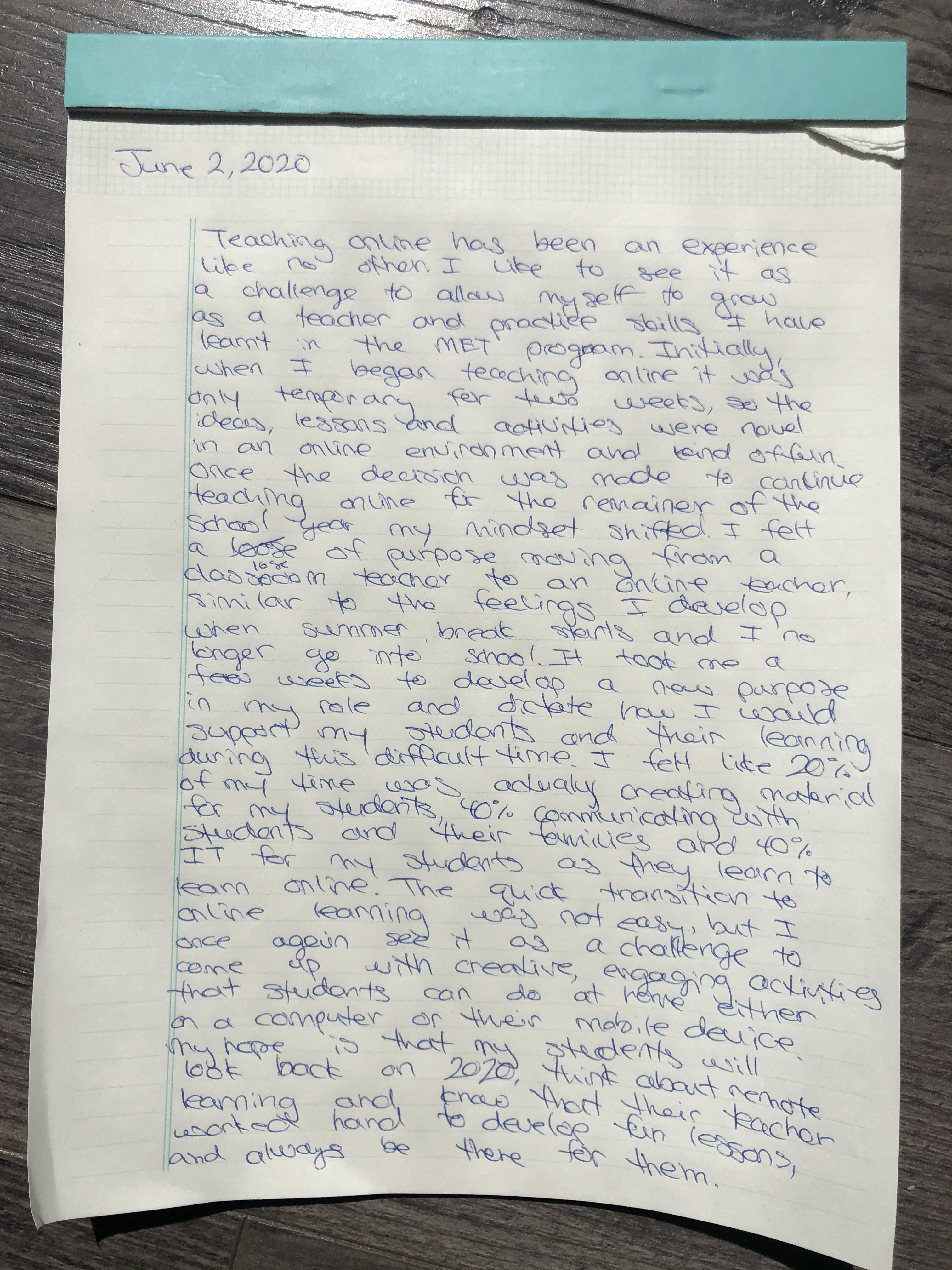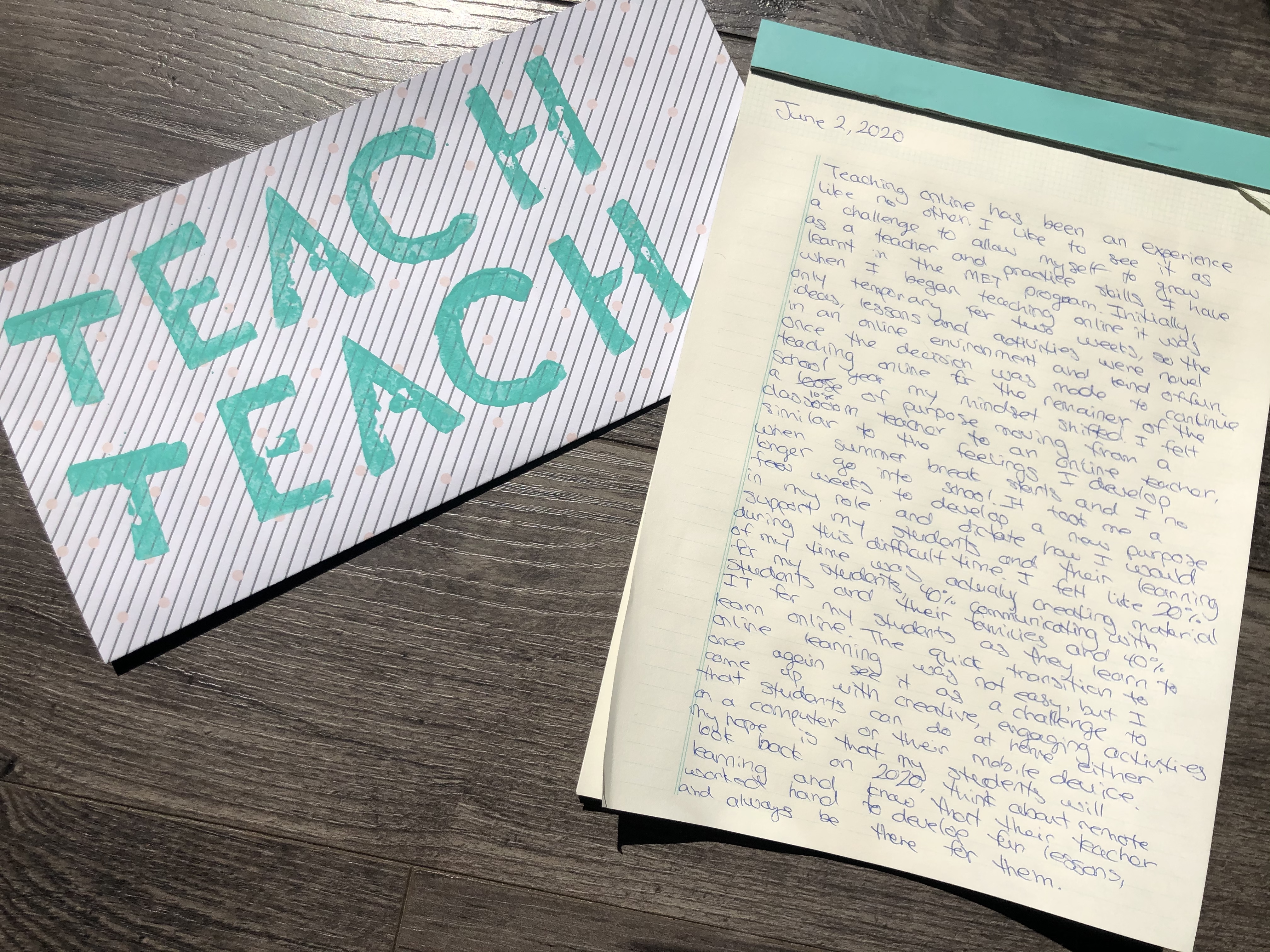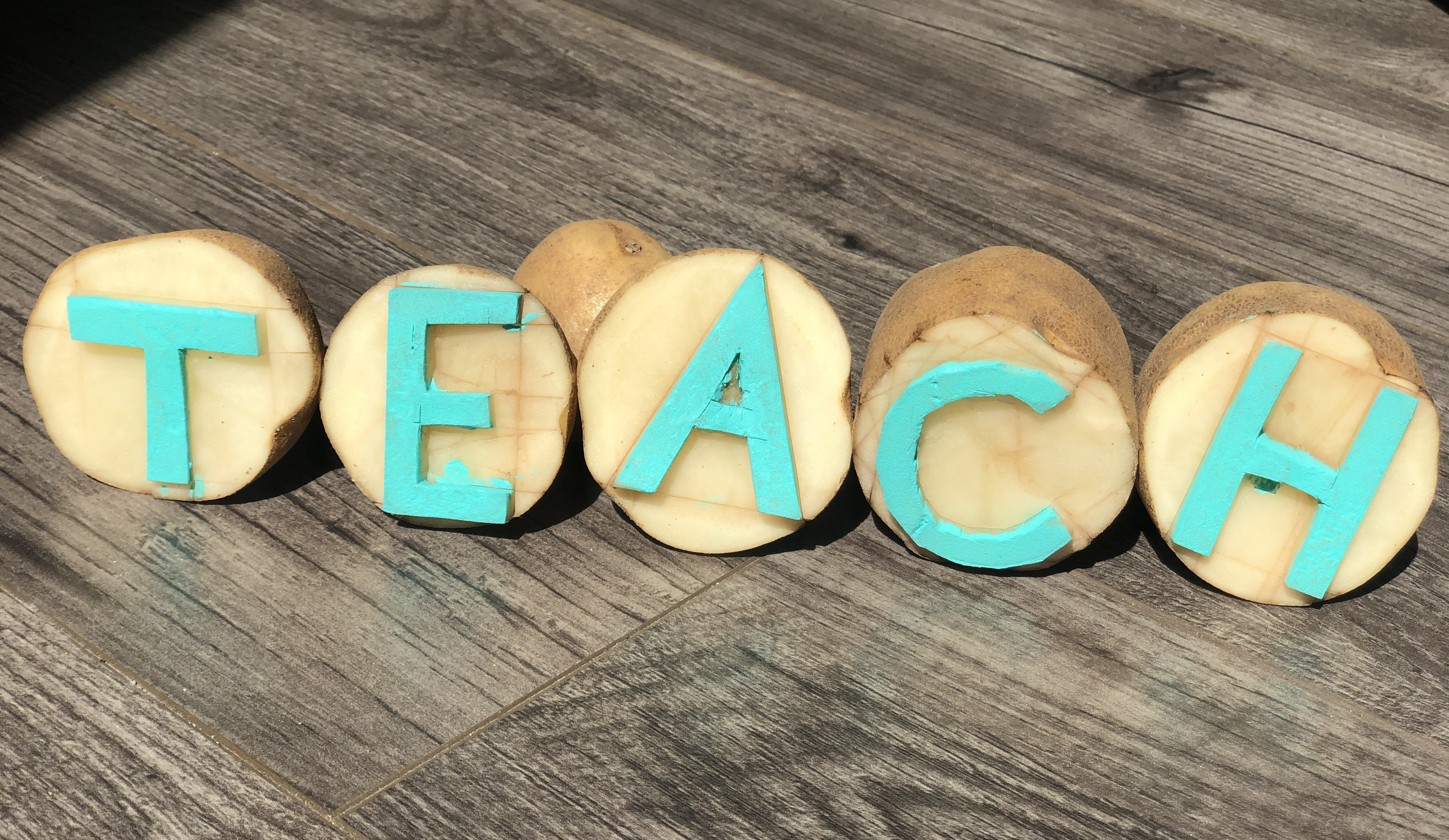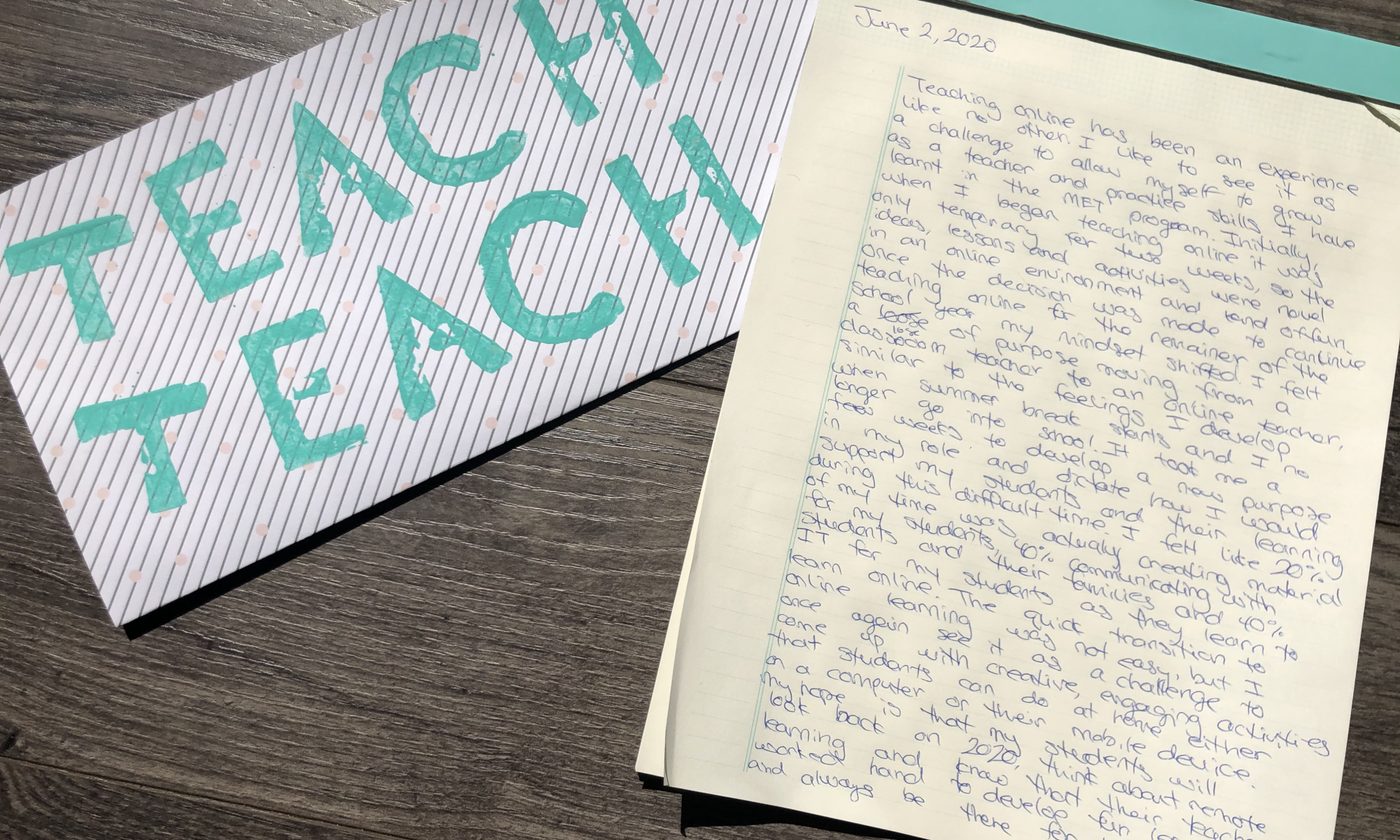Part 1: Manual Script

Writing by hand is not something I do normally. I would say the purpose I have for writing by hand would be giving feedback to students on paper assignments and making notes on a whiteboard/post its. The past few months of teaching online has drastically reduced the amount of handwriting I do and has limited to the post it notes for reminders. I spend ~90% of my time typing to communicate or make notes for myself. The lack of practice I have with handwriting make this task very difficult for me. A quarter way through my reflection I found my hand starting to cramp, a sense of “oh no, I have a long way to go” came over me.
The part that I found easy about this task was writing 500 words. I had to google how many pages 500 words was and it told me 8 minutes it about the length of time it takes to write and is around one page. At first, I thought I would struggle with writing for that length of time but the words just flowed out of me. What I found challenging about this task was my lack of stamina. Like I mentioned, my hand got sore pretty quickly and I have to give me hand a break before I was able to type this reflection.
Another challenge I faced was with editing. I had this weird sensation to “go back” and “delete” what I had written. I am so used to being able to back space that my brain automatically went in that direction. When I made my first mistake I paused and had to think about what to do. I few techniques I used was to not edit it, re-write over it and edit after. For this reflection I chose to use a pen, which limited my ability to make edits. It didn’t even occur to me that a pencil could be an option as a writing utensil. Since I handwrite so rarely I felt out of practice in terms of preparation. I had to get a pad of paper out of my closet that hadn’t been touched in months!
The most significant difference between writing by hand and a mechanized form of writing such as typing is my ability to edit my work and thinking about spelling. Spelling is something I have never felt strong at and I continue to work on. When I was writing by hand I found myself thinking about my spelling more than I would when I type and that resulted in fewer spelling errors I believe. Often when I type I get my ideas out and then I go back and make corrections as needed. I prefer typing because I find my fingers work quicker than my hand and I am able to get my ideas on the page quicker. This task reminded me of a podcast I listened to about Graphology (Ward, 2019). This podcast with Sylvia Kessler discusses handwriting and she shares how handwriting is a skill that you need to practice if you want to be good at it. Totally worth a listen! I have always felt like my handwriting is kind of sloppy however I haven’t done anything about it to make it smoother.
Overall, I enjoyed writing for 8 minutes as a time to reflect on my experience with teaching remotely, it was a relaxing and very meditative experience for me.
Part 2: Potato Stamps

I loved having an excuse to do something creative with potato’s, even for a short period of time. At first, I thought this activity would be easy, and the task itself is an easy thing to accomplish but when I really got into it I realized that it was much more difficult than I had expected. The most challenging part was the printing onto the paper. As soon as I removed the stamp to see the result I wanted to “undo” it so I could improve it, but that isn’t an option, so I just had to go with it. When trying to print a second time as similar as possible was an even greater challenge due to the paint, pressure and angle of the stamp.
Creating the stamps was a long process as I made a mistake with the letter E by doing it backwards. I did not think about reversing the stamp so it would read left to right on the page when printed. In total it took me 20 minutes to make the stamps and print onto the page. It is crazy to think how long it would take to print a sentence or a paragraph if two words took 10 minutes to print on the page.

The letters that I used were T-E-A-C-H. This word forced me to think about how to print the E and the C so they were correct on the page, but I did not have to worry about capital T, A or H. If I chose to use lower case letters, I think it would have been more challenging to reproduce. While reproducing, the imperfections of the stamps were made visible. Initially when I made the stamp it looked consistent across, however when I pressed the stamp with paint, I noticed that my stamp was not level which caused sections of the letter to not imprint.

The mechanization of writing was a very lengthy process compared to writing by hand as I did in the first part of this task. What I find interesting is that when I completed the handwritten piece I felt as though typing was so much easier, but when I had to print out the letters myself, I preferred writing by hand. The printing press has greatly developed to allow for computers to type and printers to print, to which I am very thankful!
While I created my potato stamps I created a time-lapse that can be seen here: Potato Stamp Time-Lapse
Reference
Ward, A. (July 19, 2019). Graphology (handwriting/forgery) with Sylvia Kessler. Retrieved from https://www.alieward.com/ologies/graphology


Wow! I love your potato letters. So much better than mine. I admit, it really bothered me to use a food item for this task . . . must be the Irish in me . . .
I know what you mean about the sense of suspension that happened when we first went to online teaching. It did sort of have a holiday feel to it, a waiting-ness, for something to happen or for things to return to normal, to wake up. I have had that feeling before, particularly at the first moment of awakening, as consciousness returns, and before the change is remembered.
I also get the intersection you worked to balance of pedagogy, content and technology. At first I focused on the technology, too, but I think it’s still the relationship that matters. A news article in March 2020 by Jenny Anderson reported that HolonIQ, an educational marketing firm, found Ed-tech firms deeply pessimistic about their ability to emulate the classroom environment online. What was missing? They simply cannot replace the teacher-student dynamic that is intrinsic to the education process.
As I reflected on that, it made me realize that, as important as technology, content and pedagogy might be, human relationships are still paramount.
Katlyn, I wondered the length of time it took for most people to write a page or so. Eight minutes you say…I guess I’m behind the curve.
You’re mention of a pencil, rather than a pen, as a tool is an interesting proposition. On the one hand, as you mention, it might be useful for edits. On the other hand, writing in pencil might work against the appeal of your writing. For example, the crispness of letters might not be so apparent using a pencil. I am reminded of the audio for this week in that in ancient times the cover of a book was often more valuable than the content in it.
I too found that spelling was an issue with writing by hand (as well as cramping). I discovered that I tend to miss the odd letter every once in a while, and I would have to go back and try to squeeze it in. I have no idea if I do this when I type, and I just correct it without thinking about it, or if the auto-correct does it, or if this is something that only happens when I write by hand. I will certainly be more aware of it when I type now, though, to see if I do it then as well.
Your point about writing with a pencil was a bit of an a-ha moment for me, as I also wrote with pen, but didn’t even consider the option of a pencil when I was reflecting on my writing! Write by hand just meant with a pen to me, for some reason! There are also those pens that are erasable, I believe, but I didn’t consider those either (and I don’t have any). It’s interesting to consider that we just assume limitations of older technology when they may in fact not be as limited as we remember.